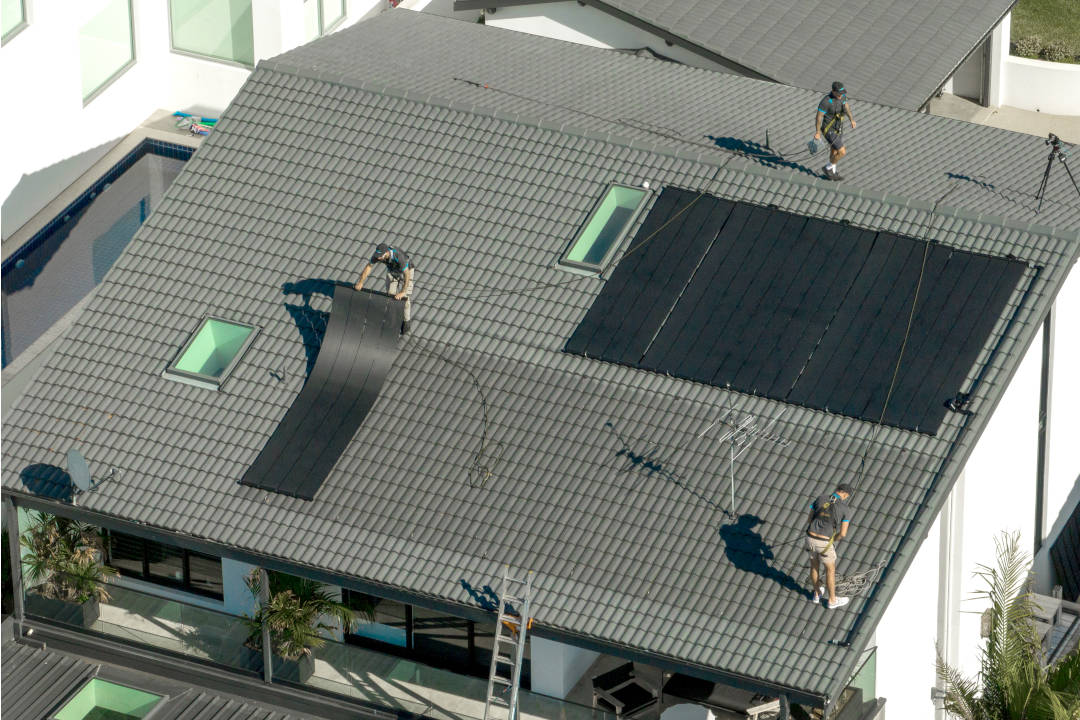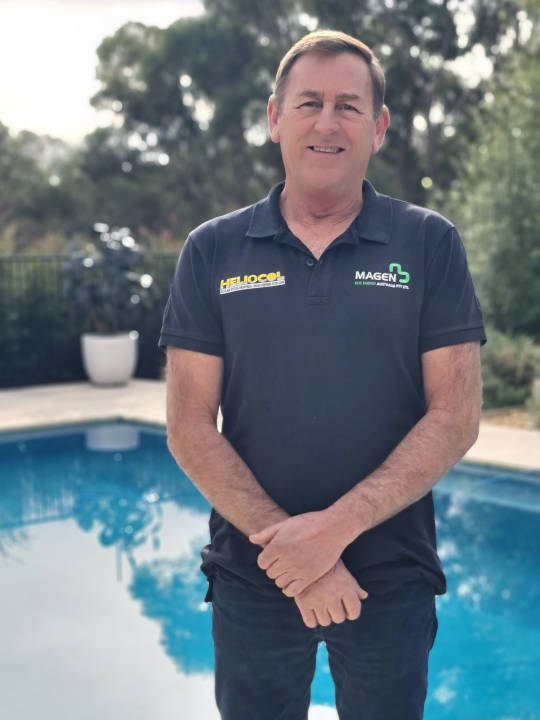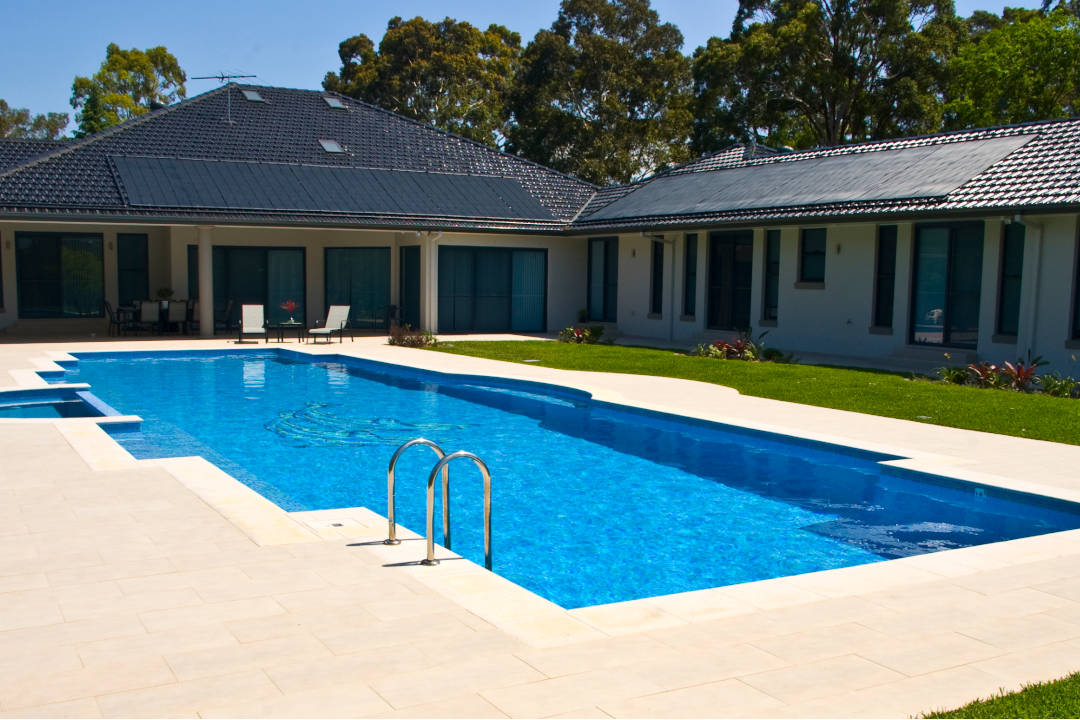A Heated Debate:
Choosing the Best Way
to Warm Up Your Pool
Residential swimming pools can greatly increase the value of a property, and significantly enhance your lifestyle. A pool is not a small investment, so it’s important to make the most use of it! Sydney Pool + Outdoor Design’s Jessica Muller chats with Paul Verheyden, the national sales manager at Magen eco-Energy who brings more than 25 years of experience in the industry, about all the pool heating options available to maximise your swimming season and get the most out of your pool.

If you’ve built a swimming pool for your home, it’s safe to assume you want to be able to use it as much as possible. “The number one factor for determining how often you use the pool is water temperature,” Mr Verheyden says. “Pool water that’s too cold (usually below 21°C) is not comfortable to swim in. In most Australian states, an unheated pool will sit around 18 to 21 degrees Celsius during the summer and shoulder months.”
To make your swimming experience more enjoyable and enticing, it is worthwhile investing in a good pool heating system. “As a general rule of thumb, a pool heating system will cost around 10 percent of the cost of the pool but will increase usage by 50 percent,” Mr Verheyden advises. There are four pool heating options you can choose from, so Mr Verheyden explains the basics of how each work to help you make an informed decision.

COVER UP
During the summer months, a pool cover will retain the sun’s heat and may keep the water warm enough for swimming the next day. “The more direct sunlight you get for your pool, the more heat it can provide. When the air temperature drops at night, it will usually lower the temperature of the pool’s water,” Mr Verheyden says. “A transparent pool cover allows maximum sunlight and heat into your pool. Short wavelengths of light will pass through the bubbles of the cover to generate heat, just like a magnifying glass does,” he continues.
Although they are the cheapest pool heating option available, pool covers do have their limitations. Mr Verheyden explains that pool covers do not suit all pools, and they do require some effort to take the cover off and put it back on each day.
SOAK UP
Using the sun’s free energy and radiant heat, solar pool heating is the most cost-effective and sustainable way to heat up a pool. “On average, a well set up solar pool heating system will achieve a temperature increase of 6 to 8 degrees during the spring, summer and autumn seasons,” Mr Verheyden says. Using this heating method can add around 4 to 6 months to your swim season, almost doubling it in comparison to an unheated pool.
“This system works by pumping pool water into a series of black heat exchange panels (known as a solar collector) which are mounted to your house roof or ancillary building, such as a shed or garage,” Mr Verheyden explains. “The sun’s rays heat the soar collector tubes, and subsequently, the pool water circulating inside them.”
Mr Verheyden advises that most solar pool heating systems can be installed in one day and usually cost between $4000 to $5000 to install, depending on a range of factors including pool size and the slope of the roof. This heating option is a simple, environmentally friendly, economical and effective way to heat your swimming pool. “All you have to do is wait for the sun to shine,” Mr Verheyden says.
WATT’S UP
Electric heat pumps are not designed to provide instant or fast heating like a gas heater. “The intended use of a heat pump pool heater is to maintain a desired temperature. It will turn on and off automatically to maintain the desired temperature, much like a home air conditioner,” Mr Verheyden advises.
“An electric heat pump extracts heat from the warm ambient air by using a fan to draw air across the evaporator coil, where liquid refrigerant absorbs this heat and turns into a gas,” Mr Verheyden explains.
“The warm gas then passes through the compressor, which increases the heat, creating a very hot gas that then passes through the condenser. The condenser transfers this refrigerant heat energy to the pool water pumping through the unit,” he continues. The heated pool water is then returned to the pool and the hot gas returns to a liquid form as it flows through the condenser back to the evaporator coil where the process begins again.
When using this method of pool heating, a pool cover is also highly recommended to reduce heat loss overnight and ensure maximum energy savings. However, it is slightly more costly to install. “On average, an electric heat pump for your pool will cost between $5000 and $8000 to purchase the unit,” Mr Verheyden says.
FUEL UP
Gas pool heaters are the only choice when you want to heat your pool quickly and for a short time. “Unlike pool heat pumps, gas pool heaters are not affected by air temperature and unlike solar pool heaters, they can efficiently operate even on rainy or cloudy days,” Mr Verheyden says.
“Gas pool heaters use either natural gas or LPG. The pool pump circulates the pool water through the filter and then to the heater. Simultaneously, the combustion chamber in the gas pool heater heats copper-nickel alloy coils. When the pool water runs through those coils, they transfer heat to the pool water which is then returned to the pool,” Mr Verheyden explains.
Although they can reliably heat your pool quickly, the disadvantage of gas heating is the expense of running the unit. They also come with higher upfront costs, with units costing between $5000 and $8000 depending on factors such as pool size, gas connection and customer expectations, according to Mr Verheyden.
THE HOT TAKE
Mr Verheyden argues against the common misconception that a pool heating system is an expensive addition to the pool and not good value for money. “In my opinion, the biggest waste of money is running and maintaining a pool and not using it because the water is not warm enough to swim in,” he says.
Reach out to the Magen eco-Energy team today to chat about its solar pool heating panels to extend your swim season. As the world’s largest manufacturer of solar pool heating panels, its expertise is invaluable.
Photography courtesy of Magen Eco Energy

